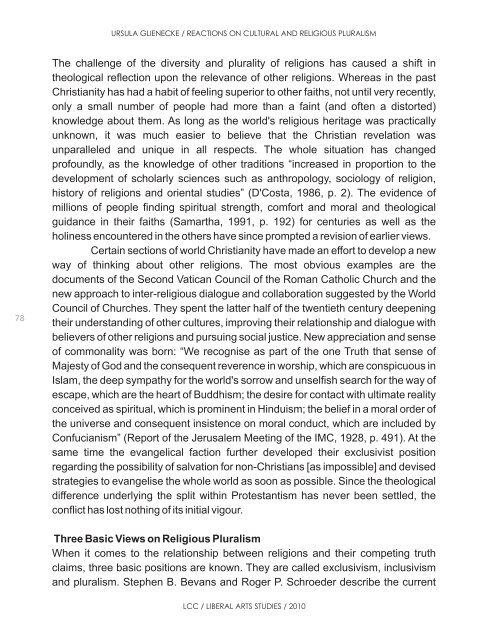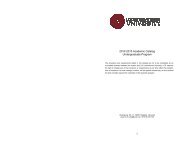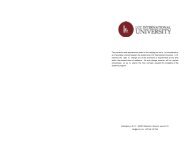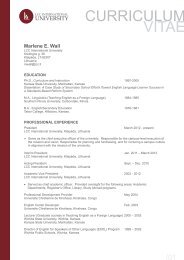lcc liberal arts studies / 2010 volume iii - LCC International University
lcc liberal arts studies / 2010 volume iii - LCC International University
lcc liberal arts studies / 2010 volume iii - LCC International University
Create successful ePaper yourself
Turn your PDF publications into a flip-book with our unique Google optimized e-Paper software.
78<br />
URSULA GLIENECKE / REACTIONS ON CULTURAL AND RELIGIOUS PLURALISM<br />
The challenge of the diversity and plurality of religions has caused a shift in<br />
theological reflection upon the relevance of other religions. Whereas in the past<br />
Christianity has had a habit of feeling superior to other faiths, not until very recently,<br />
only a small number of people had more than a faint (and often a distorted)<br />
knowledge about them. As long as the world's religious heritage was practically<br />
unknown, it was much easier to believe that the Christian revelation was<br />
unparalleled and unique in all respects. The whole situation has changed<br />
profoundly, as the knowledge of other traditions “increased in proportion to the<br />
development of scholarly sciences such as anthropology, sociology of religion,<br />
history of religions and oriental <strong>studies</strong>” (D'Costa, 1986, p. 2). The evidence of<br />
millions of people finding spiritual strength, comfort and moral and theological<br />
guidance in their faiths (Samartha, 1991, p. 192) for centuries as well as the<br />
holiness encountered in the others have since prompted a revision of earlier views.<br />
Certain sections of world Christianity have made an effort to develop a new<br />
way of thinking about other religions. The most obvious examples are the<br />
documents of the Second Vatican Council of the Roman Catholic Church and the<br />
new approach to inter-religious dialogue and collaboration suggested by the World<br />
Council of Churches. They spent the latter half of the twentieth century deepening<br />
their understanding of other cultures, improving their relationship and dialogue with<br />
believers of other religions and pursuing social justice. New appreciation and sense<br />
of commonality was born: “We recognise as part of the one Truth that sense of<br />
Majesty of God and the consequent reverence in worship, which are conspicuous in<br />
Islam, the deep sympathy for the world's sorrow and unselfish search for the way of<br />
escape, which are the heart of Buddhism; the desire for contact with ultimate reality<br />
conceived as spiritual, which is prominent in Hinduism; the belief in a moral order of<br />
the universe and consequent insistence on moral conduct, which are included by<br />
Confucianism” (Report of the Jerusalem Meeting of the IMC, 1928, p. 491). At the<br />
same time the evangelical faction further developed their exclusivist position<br />
regarding the possibility of salvation for non-Christians [as impossible] and devised<br />
strategies to evangelise the whole world as soon as possible. Since the theological<br />
difference underlying the split within Protestantism has never been settled, the<br />
conflict has lost nothing of its initial vigour.<br />
Three Basic Views on Religious Pluralism<br />
When it comes to the relationship between religions and their competing truth<br />
claims, three basic positions are known. They are called exclusivism, inclusivism<br />
and pluralism. Stephen B. Bevans and Roger P. Schroeder describe the current<br />
<strong>LCC</strong> / LIBERAL ARTS STUDIES / <strong>2010</strong>






